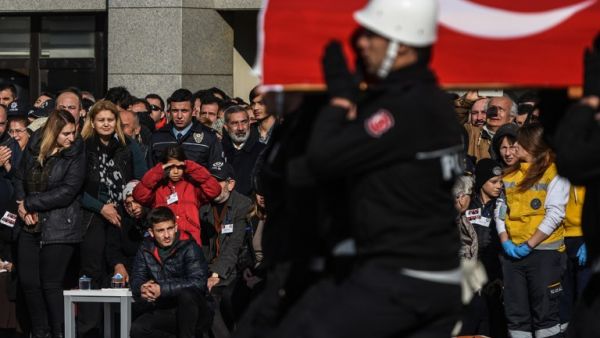A splinter group of the outlawed Kurdistan Workers' Party (PKK) claimed responsibility for Saturday night's double bomb attack in Istanbul, which left 38 people dead and scores injured.
The Kurdistan Freedom Falcons (TAK) said in a statement on Sunday that the two attacks were timed to go off simultaneously near the Vodafone arena, home ground of Besiktas football club, which had just concluded a match against Bursaspor.
At least 30 police officers and seven civilians were among the dead, according to Turkish Interior Minister Suleyman Soylu. A further 166 people were injured, many still in serious condition, while one of the dead was yet to be identified.
The group said that two of their members died in the attacks, but they did not specify if both were suicide attackers. The Turkish government said one of the explosions was due to a car bomb, while the other was a suicide attack.
According to Interior Minister Soylu, 10 people have been detained in connection with the blasts on Saturday.
The TAK said they carried out the attack to protest the imprisonment of PKK leader Abdullah Ocalan and the Turkish government's ongoing military operation in the mainly Kurdish south-east of the country. "Nobody should expect to lead a peaceful life in Turkey" as long as these situations persist, the TAK statement said.
Turkish President Recep Tayyip Erdogan on Sunday promised that the attackers would pay "a yet higher price" for their actions.
After a visit to the injured in Istanbul, Erdogan said that the most important thing for the country was the fight against "the plague of terror."
Turkey's pro-Kurdish People's Democratic Party (HDP) strongly condemned the attacks.
"These two bomb attacks in Istanbul have once again brought sorrow to many homes in Istanbul. We are very sad and we share the pain," the HDP said in a statement calling for an end to "polarizing politics" in Turkey.
Turkish Deputy Prime Minister Numan Kurtulmus, in comments to the Anadolu Agency, said the use of a car bomb was typical for an attack by the PKK.
The attack drew sharp criticism from the European Union, which stressed its solidarity with Turkey amid ongoing tensions over a post-coup crackdown and stalling progress in Turkey's admission to the bloc.
"We reaffirm our strong condemnation of all acts of terror and confirm our continued commitment to work together closely with Turkey in combatting the threat of terrorism," EU foreign policy chief Federica Mogherini said.
Nato Secretary General Jens Stoltenberg said the military alliance was "united in solidarity with our ally Turkey" and was "determined to fight terrorism in all its forms."
Meanwhile Western Europe came under criticism from Erdogan's Justice and Development Party (AKP) over its response to Kurdish militants.
"While in Western European countries the PKK spreads its propaganda without being treated like other terrorist organizations such as [Islamic State], in Turkey they are killing people every day," said Mustafa Yeneroglu, an AKP parliamentarian and a close ally of the president.
Istanbul, Ankara and other areas in Turkey have been hit by several bombings since last year.
Some bombs, notably those targeting security forces, have been claimed by Kurdish militants while other attacks are blamed on Daesh.








